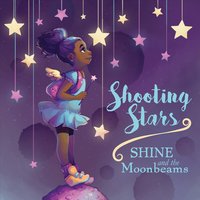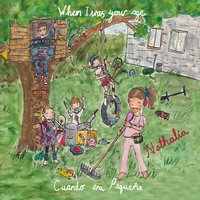When most people think about Smithsonian Folkways' kids' artists, I'd guess that the first names that come to mind are Ella Jenkins and Pete Seeger, with probably Woody Guthrie close behind. But if I were to make that trio a quartet, I'd add Lead Belly to that list. Lead Belly (born Huddie William Ledbetter in 1889) was a master of the 12-string guitar, and starting in the mid-1930s until his death in 1949, he recorded for a wide variety of labels.
His outsized influence on blues music generally masks the fact that he only recorded one album specifically for kids for Folkways, and that was an album released more than a decade after his death. But in 1999, Smithsonian Folkways released Lead Belly Sings for Children, a collection of songs Lead Belly specifically recorded for kids in the 1940s along with other tracks that fit right in. The liner notes describe it as "essential listening for all ages," and in this case, the hype fits.
Nearly three quarters of a century after Lead Belly started recording for Folkways founder Moses Asch, Dan Zanes has joined in. As part of the typically detailed and lovingly-produced liner notes to the album, Zanes writes of being seven years old and discovering a Lead Belly record in the basement of his local library just as he was getting interested in the guitar. In Zanes' telling, Lead Belly's music played no small role in Zanes' path toward becoming a musician. In other words, this is a labor of love.
Now much of Zanes' all-ages musical path has felt like it came out of love and not any sort of calculated attempt at super-stardom, but this album does feel to me just slightly more personal, as if going back to one of his first inspirations helped Zanes tap into his own inspiration. In time-honored folk tradition, Zanes adds his own voice and approach. “Bring Me a Little Water, Sylvie” is given a slightly more uptempo, lilting feel. Zanes has always been willing to make a space for hip-hop on his albums, but he's opened up a lot more room for it now. There are many reasons that might be appropriate, but probably the most appropriate is that the arrangements breathe new life into these tracks. The original Lead Belly recordings, after all, were primarily the man and his guitar -- they sound great, but there can be a certain monotony to those tracks. But the arrangements here are wide open: in addition to the music store's worth of instruments -- concertina, saxophone, cowbell, mandolin -- five of the tracks feature guest raps.
As with most music Zanes releases, this album features a couple dozen guest artists. Some are famous -- hey, there’s Billy Bragg on “Rock Island Line!”… Is that really Chuck D offering up a verse on “Skip To My Lou?" to name but a couple such appearances. But just as important to the overall feel are the guest turns by the musicians we’re probably less familiar with, like Jendog Lonewolf’s rap on “Julie Ann Johnson," while Memphis Jelks, invited onto “Skip To My Lou” by Chuck D., just about steals the show from the elder statesman.
If there’s anything I miss from the album, it’s the voices of kids. Folkways albums for kids have always had lots of participation by kids -- Lead Belly Sings for Children is no exception, as it includes a number of tracks featuring Lead Belly singing to and with kids. In contrast, aside from “More Yet,” there’s no chorus of kids on Zanes’ album. (“Little Goose” makes an appearance on the intro to “Polly Wee” along with Father Goose, but that’s not really what I mean.)
After a series of themed albums that were musically satisfactory but less than fully… party-filled, Lead Belly, Baby! most closely replicates the freewheeling spirit of his early DZAF albums, the ones that propelled him into kids music stardom. While in many ways this album will sound familiar to those fans of those albums (nearly twenty years old at this point), Dan Zanes is also walking some different musical paths than he was twenty (or thirty or forty) years ago. If looking back to one of his earliest musical idols helps kick off another series of musical explorations into the future, then by all means bring it on. Highly recommended.




















